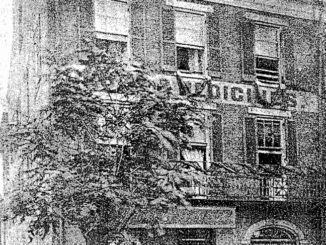
As Josh opened his cabin door, the morning mist enveloped him, sending an unexpected chill throughout his body. His first instinct was to sneak back to the warmth of the cabin but he quickly remembered his mission for the day. Looking to the eastern sky, he looked for the very thin line of light that heralded sunrise but, not seeing it, he turned toward the shed housing his horses.
Job, the elder of his two horses, was still anchored in a corner sleeping. He turned toward the next stall and was greeted with the eagerness of youth, the expectation of a day’s outing. “You remembered about this special day, didn’t you, Bullet?” Josh’s son named the young horse, saying, “He is as fast as a speeding bullet,” and the name seemed to please the animal so it remained his call.
With all gear in place, Josh led Bullet up to the cabin where his wife, Jenny, handed him his saddlebags, the water jug, and a cloth bag which he hooked on the front of his saddle. Few words were spoken because they had discussed the trip and how important it was to their future. “Remember, Mr. Williams is just over the hill if you need help and Andrew said he would check in during the day.” As he rode away his heart was heavy with worry – this was the first time being apart since coming to this land – but his eyes were sparkling with his mission.
Within thirty minutes, he hitched Bullet to the rail and entered Andrew McFadden’s station, a welcome site since 1788 on the trail from the Kentucky settlement and the Cumberland settlement (Nashville). Greetings were exchanged among the early arrivals and two strangers were welcomed. “William said the two of you are headed to Circuit Court today. It should be a good day for the trip. We just came from there last night and the trace was in good shape. Watch out for the marsh lands along the way. The rain the last few days have made it mushy.”
William Gravel, new resident of the area, was joining his new neighbor on today’s trip.
Josh and William kept a good pace on the trail and conversation made the trip easier. William told of being down around a three springs area and bought some garden seeds for the miss. He was surprised to see the Sheriff of Logan County in this area… said he was checking on two brothers who were making their claim on land with a large spring of water flowing across the land. He warned the two men to be on the lookout for Indians. Being new to the land, William asked a lot of questions about claiming land.
Josh explained the land had not been available for settlers until recently. The land belonged to Virginia but some explorers began crossing the territory so the state opened the Kentucke County in December 1776. After more traffic by explorers and settlers, the new Kentucke County was divided into three large counties, Fayette, Jefferson, and Lincoln counties in November 1780. Records show the counties were increased to five counties, then eight counties three years later. After the Revolutionary War there was a rush of individuals seeking claims of land. “We are in Lincoln County but it presents a problem because of its size. It extends from the Appalachian Mountains across the southern border to the judicial center in Logan County. That’s a long distance for carrying out business concerns like we are doing today.”
“Can we not get a circuit court built closer?” William asked.
“That’s what these gentlemen were discussing this morning. The governor must sign up on it. Studies made, decisions agreed on, and plans launched before we will see any change. We hope when the 1796 legislature meets this December it will be agreed upon and a new county can become the twenty-fourth county in Kentucky.”
“I met General Eliza Covington, one of the area’s earliest landowners, at McFadden’s right after arriving here.”
“The General is one of our strongest advocates for the county status. He surveyed my land for us so I’m anxious to get it recorded.”
“What happens after the county is approved?”
“The Governor will appoint a Justice and a clerk for the county. Residents living in the area will be appointed commissioners to establish the guidelines for the orderly government of the area. First on their agenda will be a courthouse and small jail. Request for licenses must be approved, rules for business must be agreed upon, cost of food, drinks, and other services must be agreed on to promote fair exchange with locals and visitors. The new established county will see an increase in new residents and the commissioners’ responsibilities will multiply to include recording of deeds, issue licenses for many kinds of services to the public, record deaths and possibly the legal distribution of wills, settle disputes between individuals, roads will be needed to connect the settlements, guidelines for standards for new businesses, public water sources need to be designed and supervised.” Josh stopped and drew a long breath at the responsibilities of the local leaders. He continued with the list. “Admitting of deeds like ours today to record, grant licenses to ordinaries, superintend public inspections, hear disputes between individuals, establish and regulate ferries, erect and maintain public buildings… the tasks just keep mounting up. We have a lot of work to make and grow into a vibrant community.”
“Their meetings will be once a month like the one where we are going today.”
Josh’s answer got lost in the wind as the travelers suddenly found themselves in the midst of other riders gathering at the edge of the center of Logan County. As soon as their mission was completed they would be facing east and returning home, dreaming all the way of the day this long trip would not be necessary again.
In December 1796, the state legislature approved the creation of a new county from the northeast portion of Logan County and named it Warren County after Dr. Joseph Warren, a hero of the battle of Bunker Hill. By March 1797, a Justice of the Peace, a circuit court clerk and the following commissioners were appointed to guide the county: William Morris, John Marshall, Price Curd, John Garrets, Bailey Anderson, James Campbell, George Moore, James Stewart, Robert Wallace, and James Douglas. The first deed recorded in the new county was 400 acres for Andrew McFadden.
-by Mary Alice Oliver
About the Author: Mary Alice Oliver is a Bowling Green native who is a 1950 graduate of Bowling Green High School. She retired from Warren County Schools after 40 years in education. Visiting familiar sites, researching historical records and sharing memories with friends are her passions.







